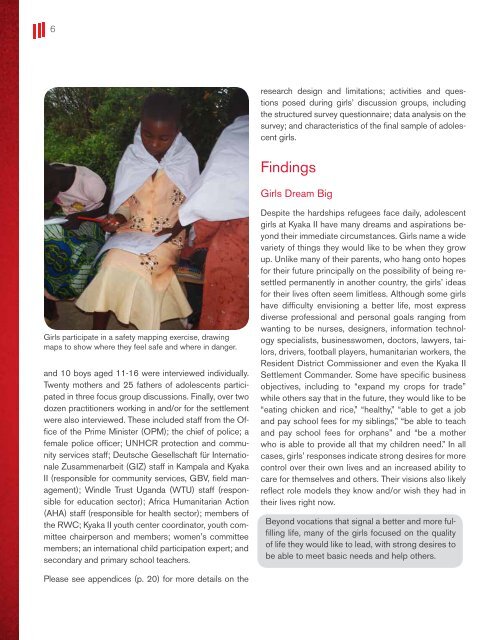Scattered Dreams, Broken Promises - Women's Refugee Commission
Scattered Dreams, Broken Promises - Women's Refugee Commission
Scattered Dreams, Broken Promises - Women's Refugee Commission
Create successful ePaper yourself
Turn your PDF publications into a flip-book with our unique Google optimized e-Paper software.
6<br />
research design and limitations; activities and questions<br />
posed during girls’ discussion groups, including<br />
the structured survey questionnaire; data analysis on the<br />
survey; and characteristics of the final sample of adolescent<br />
girls.<br />
Findings<br />
Girls Dream Big<br />
Girls participate in a safety mapping exercise, drawing<br />
maps to show where they feel safe and where in danger.<br />
and 10 boys aged 11-16 were interviewed individually.<br />
Twenty mothers and 25 fathers of adolescents participated<br />
in three focus group discussions. Finally, over two<br />
dozen practitioners working in and/or for the settlement<br />
were also interviewed. These included staff from the Office<br />
of the Prime Minister (OPM); the chief of police; a<br />
female police officer; UNHCR protection and community<br />
services staff; Deutsche Gesellschaft für Internationale<br />
Zusammenarbeit (GIZ) staff in Kampala and Kyaka<br />
II (responsible for community services, GBV, field management);<br />
Windle Trust Uganda (WTU) staff (responsible<br />
for education sector); Africa Humanitarian Action<br />
(AHA) staff (responsible for health sector); members of<br />
the RWC; Kyaka II youth center coordinator, youth committee<br />
chairperson and members; women’s committee<br />
members; an international child participation expert; and<br />
secondary and primary school teachers.<br />
Despite the hardships refugees face daily, adolescent<br />
girls at Kyaka II have many dreams and aspirations beyond<br />
their immediate circumstances. Girls name a wide<br />
variety of things they would like to be when they grow<br />
up. Unlike many of their parents, who hang onto hopes<br />
for their future principally on the possibility of being resettled<br />
permanently in another country, the girls’ ideas<br />
for their lives often seem limitless. Although some girls<br />
have difficulty envisioning a better life, most express<br />
diverse professional and personal goals ranging from<br />
wanting to be nurses, designers, information technology<br />
specialists, businesswomen, doctors, lawyers, tailors,<br />
drivers, football players, humanitarian workers, the<br />
Resident District <strong>Commission</strong>er and even the Kyaka II<br />
Settlement Commander. Some have specific business<br />
objectives, including to “expand my crops for trade”<br />
while others say that in the future, they would like to be<br />
“eating chicken and rice,” “healthy,” “able to get a job<br />
and pay school fees for my siblings,” “be able to teach<br />
and pay school fees for orphans” and “be a mother<br />
who is able to provide all that my children need.” In all<br />
cases, girls’ responses indicate strong desires for more<br />
control over their own lives and an increased ability to<br />
care for themselves and others. Their visions also likely<br />
reflect role models they know and/or wish they had in<br />
their lives right now.<br />
Beyond vocations that signal a better and more fulfilling<br />
life, many of the girls focused on the quality<br />
of life they would like to lead, with strong desires to<br />
be able to meet basic needs and help others.<br />
Please see appendices (p. 20) for more details on the






